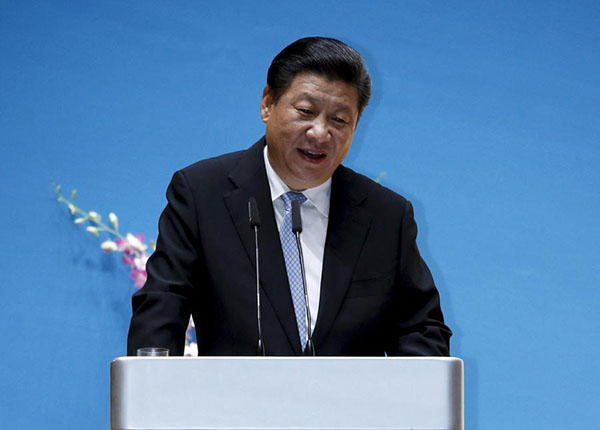US ploy in South China Sea bound to fail
Updated: 2015-11-17 10:54
By Jia Yu(China Daily)
|
||||||||
 |
|
President Xi Jinping speaks during the "Forging A Strong Partnership to Enhance Prosperity of Asia" Lecture at the National University of Singapore, Nov 7, 2015. [Photo/Agencies] |
President Xi Jinping’s visit to the Philippines for the Asia-Pacific Economic Cooperation meeting from Nov 17 to 19 has quelled speculations that the maritime disputes with the host nation could make him decide otherwise.
Last week Philippines President Benigno Aquino III assured visiting Chinese Foreign Minister Wang Yi that the APEC meeting would focus on Asia-Pacific regional economic cooperation without raising the disputes in the South China Sea, as most members including China had agreed. But the US State Department has hinted that the South China Sea issue could be raised during the meeting despite Manila’s efforts to prevent the agenda from deviating from free trade and sustainable growth in and common prosperity of the Asia-Pacific region.
As the world’s second-largest sea-lane that connects the Indian Ocean and Pacific Ocean, the South China Sea is of great strategic importance to all countries in the region, as well as the US and European countries.
Nearly 80 percent of global trade depends upon maritime transportation, and about one-third of it is carried out through the South China Sea, which sees the passage of at least 40,000 ships a year. The number of oil tankers that sail through the Strait of Malacca, a critical passage through regional waters, is almost three times that of the Suez Canal and five times of the Panama Canal. Two-thirds of the global trade in liquefied natural gas is also conducted through the waterway.
China has more stakes that any other country in safeguarding peace and stability in the South China Sea, because it is a major channel of its global economic network. So ensuring smooth transportation (of energy sources) and navigation through the South China Sea is not only conducive to the shared interests of all Asia-Pacific economies - such as China, the US, Japan, the Republic of Korea and the Association of Southeast Asian Nations - but also economies elsewhere.
- Global health entering new era: WHO chief
- Brazil's planning minister steps aside after recordings revelation
- Vietnam, US adopt joint statement on advancing comprehensive partnership
- European border closures 'inhumane': UN refugee agency
- Japan's foreign minister calls A-bombings extremely regrettable
- Fukushima impact unprecedented for oceans: US expert

 Stars of Lijiang River: Elderly brothers with white beards
Stars of Lijiang River: Elderly brothers with white beards
 Wealthy Chinese children paying money to learn British manners
Wealthy Chinese children paying money to learn British manners
 Military-style wedding: Fighter jets, grooms in dashing uniforms
Military-style wedding: Fighter jets, grooms in dashing uniforms
 Striking photos around the world: May 16 - May 22
Striking photos around the world: May 16 - May 22
 Robots help elderly in nursing home in east China
Robots help elderly in nursing home in east China
 Hanging in the air: Chongqing holds rescue drill
Hanging in the air: Chongqing holds rescue drill
 2.1-ton tofu finishes in two hours in central China
2.1-ton tofu finishes in two hours in central China
 Six things you may not know about Grain Buds
Six things you may not know about Grain Buds
Most Viewed
Editor's Picks

|

|

|

|

|

|
Today's Top News
Liang avoids jail in shooting death
China's finance minister addresses ratings downgrade
Duke alumni visit Chinese Embassy
Marriott unlikely to top Anbang offer for Starwood: Observers
Chinese biopharma debuts on Nasdaq
What ends Jeb Bush's White House hopes
Investigation for Nicolas's campaign
Will US-ASEAN meeting be good for region?
US Weekly

|

|







